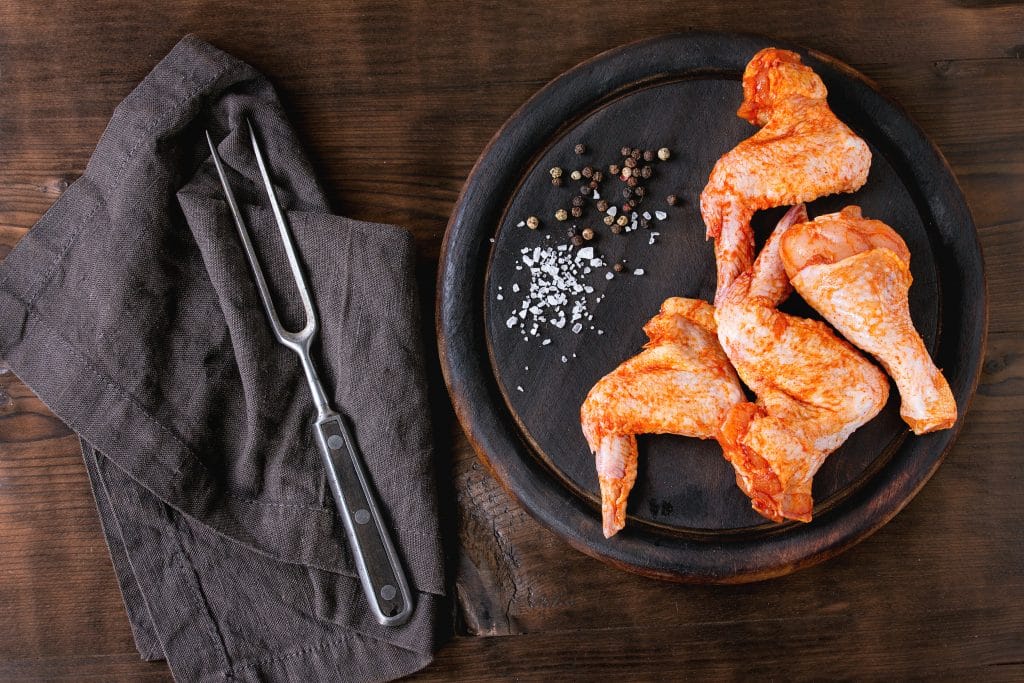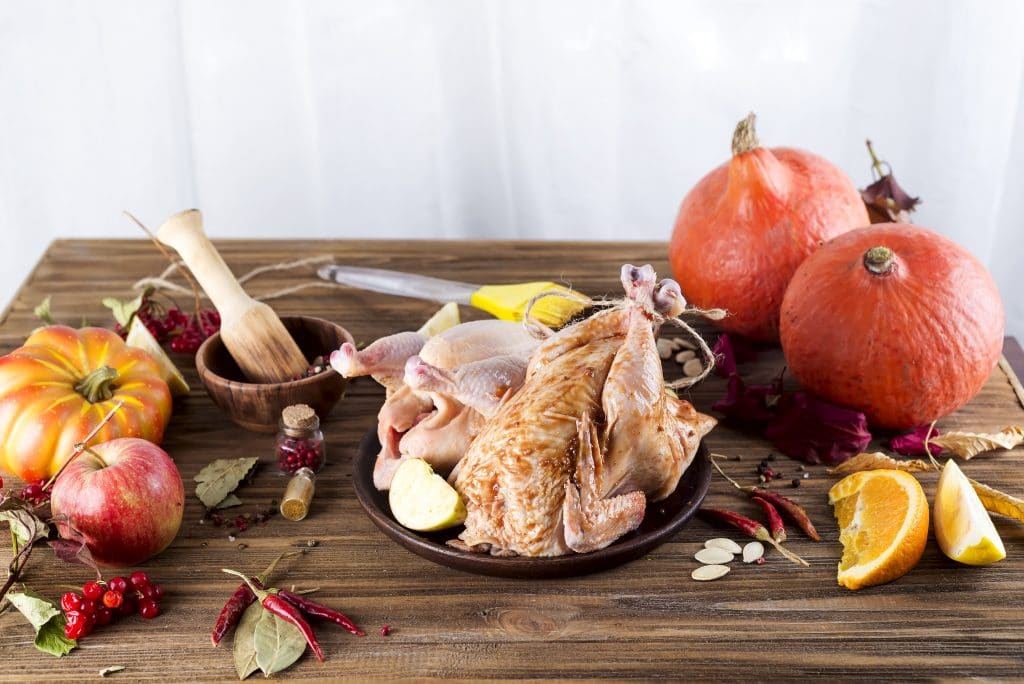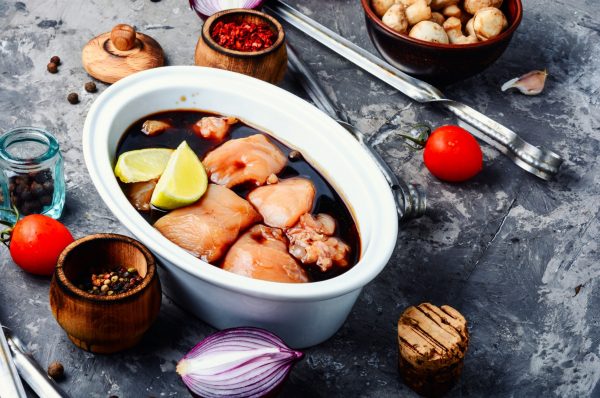How Long Can You Marinate Chicken?
Important Note: When you buy through our links, we may earn a commission. As an Amazon Associate we earn from qualifying purchases. Content, pricing, offers and availability are subject to change at any time - more info.
Many recipes call for marinating chicken to improve its flavor profile. You may worry about the health and taste aspects of leaving the chicken to stand in a marinade for several hours or more, but the marinated chicken should be safe as long as you follow the recipe guidelines. If you marinate your chicken for too long, you can change the texture of the meat due to the tenderizing process.
Raw chicken can be marinated for a few hours to 2 days, provided it is stored in the fridge. After 2 days, the marinade breaks down the protein structure, making the chicken spongey and unpalatable. Different marinades require different durations; more acidic marinades will break the meat down faster.
As you’ll notice, different recipes call for different marinades, and these ingredients will alter the length of time you need to leave your chicken in the marinade. It’s always best to follow the recipe suggestions regarding marinade time, but with a bit of know-how, you’ll have a good idea of which marinades need more time and which will need less. Marinating chicken can result in tasty meat while still being safe to eat.
- How Long Can You Marinate Chicken In The Fridge?
- What Happens If I Marinate Chicken For Too Long?
- Marinade Ingredients For Chicken
- Time Guides For Marinating Chicken
- Marinading Chicken Safely
- So, How Long Can You Marinate Chicken?
How Long Can You Marinate Chicken In The Fridge?
Marinating a chicken should always be done in the fridge, even if you’re only leaving the meat for a few hours. Refrigeration is the best practice for meat hygiene and food safety and imperative if you want to avoid any chance of spoiled food.
Various recipes will recommend different marinating times, but they will generally range from about 6 hours up to 2 days. Many cooks suggest that chicken never be left to marinade for longer than a day, as you will negatively affect the flavor and texture profile. Dark meat takes longer to marinade than white meat
The marinade works to tenderize the meat, add more moisture, and infuse it with flavor. When you soak your raw chicken in a seasoned marinade mixture, the enzymes and acids weaken the meat’s tissue and fibers, breaking them down.

What Happens If I Marinate Chicken For Too Long?
If you leave chicken to over-marinate, the proteins will break down to the point where the meat ends up with a mushy or spongey texture. With a marinade made from a mixture of acids (citrus, vinegars, buttermilk) and enzymes (papaya, pineapple, mango), you could easily only need to marinate your meat for 2 hours.
High acid marinades can also make chicken denser and tougher if left for too long.
Even slower-acting marinades like a buttermilk and lime marinade for fried chicken shouldn’t be left longer than 24 hours. The longer you plan to marinate your chicken, the more diluted the mixture should be, or you risk overwhelming the chicken’s natural flavor.

Marinade Ingredients For Chicken
Most marinades combine a mix of fats, sugars, salts, flavorings, and acid or enzymes. Each recipe will utilize these in some combination to provide a marinade with a different flavor profile.
When marinating chicken, it’s best to cut it into pieces if you plan to fry it. Spatchcocking is an excellent way to ensure the marinade covers the chicken equally if you’re marinating a whole chicken for roasting.
This BBC Good Foods video walks you through the process to spatchcock a chicken correctly.
While meat off the bone will marinate faster, it is best to leave the meat on the bone if you want a better, deeper flavor.

Time Guides For Marinating Chicken
While marinades will have a variety of ingredients, there is usually a star ingredient that helps develop the flavor. Depending on how acidic that is, it will result in a shorter time for marinades. Salt and sugar are also critical players in marinades, as they also break down the meat — think of brine marinades for Thanksgiving turkey as an example.
Vinegar
Vinegar-based marinades such as those featuring Balsamic, apple cider, or rice vinegar will tenderize chicken quite quickly. It’s best to marinate for about 2 hours, remove the chicken from the marinade and leave the chicken to sit for another 2 hours before cooking. Vinegar will leave a chicken stringy and tough, so chefs advise against marinading with vinegar for longer than 12 hours.
Yogurt
Yogurt uses lactic acid to break down the protein fibers, and as such, it is a reasonably mild marinade. You can change the flavor in as little as 15 minutes, but chicken can be left in a yogurt marinade for about 24 hours, making it ideal to use for an overnight marinade.
Olive Oil
Olive oil features in many delicious fat-based marinades, as the fat coats the chicken and helps the flavors of the other ingredients penetrate the meat. You can use an olive oil marinade on chicken for 30 minutes or leave it overnight. The slower-acting olive oil marinades make this another ideal long marinade for up to 24 hours.
Lemon Juice
Citric marinades using lemon juice or lime juice are high acid marinades and work very quickly. Although some recipes suggest leaving citric marinades for up to 24 hours, the consensus is that this will negatively impact the texture of the chicken. Chicken reaches its peak marinating flavor quite quickly, so 30 minutes to 2 hours will be more than enough with lemon juice-based marinades without denaturing the protein and leaving the chicken mushy.
Buttermilk
Like yogurt, using buttermilk can give you a longer marinating time. Buttermilk marinades are perfect for leaving overnight, but avoid marinating your chicken for longer than 24 hours.
Papaya
The natural enzymes in fruits like papaya and pineapple start to ‘digest’ the meat, breaking it down and tenderizing it. However, unless you’re working with very tough meats, papaya marinades should only be left for a few hours. For chicken, it’s recommended to leave it no longer than 2 hours in a papaya marinade.
Marinading Chicken Safely
As you’re dealing with raw meat, there is also the question of food safety. While you can marinate chicken for up to 2 days in the fridge, this isn’t recommended because of how it changes the texture and taste of the meat. Always follow the tips below to ensure you are handling your raw chicken safely and hygienically and prevent any issues with food poisoning.
- When preparing your chicken for the marinade, work on a cutting board that you use only for chicken and other meats to avoid cross-contamination.
- Keep your marinade and chicken in a closed container made of either glass, ceramic, or plastic. Metal containers are reactive and could contaminate your food.
- Always marinate in the refrigerator. Even if the guideline is to soak the meat for 15-30 minutes, it is still best to place the chicken in the fridge rather than leave it on a counter.
- The left-over marinade should be thrown away and not reused for another batch of chicken. If you are going to use the marinade for a sauce or basting for the chicken you prepared, bring it to a boil in a saucepan, and let it boil for at least 3 minutes first.
So, How Long Can You Marinate Chicken?
When using marinades for chicken, the length of time will depend on the main ingredients. Citric-based marinades like lemon or lime work faster than lactic-acid ones such as yogurt or buttermilk. Chicken benefits from shorter marinade times, and it is rarely necessary to go above a few hours. If you decide to marinate for longer, avoid marinating for more than 24 hours. After 2 days of marinading, most chicken will be mushy, stringy, and unpalatable.
























